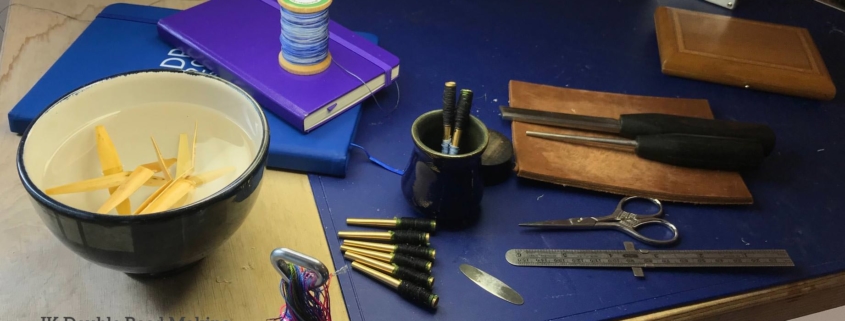Reed Hibernation
I maintain the faith that every experience brings some sort of blessing. In this moment, my cheeks are hot and my ears have closed somehow with that narrow noisiness. It is my old fear of incompetence but I don’t recognize it yet. The blessing in this situation is yet hidden, completely illusive for me. I cross my fingers, figuratively speaking, as I open my reed case. It is a very old and stylish, leather bound converted cigarette case, one of those really thin ones, the kind you can’t find anywhere anymore.
Please! I pray silently, let there be a playable oboe d’amore reed in here!
After all these years, if there is a Reed God, she is accustomed to my petitions.
The concert is in one week and the envelope with my music lies ignored and unopened under piles of other music on my stand where I put it two or more weeks ago. A wave of discomfort washes over me as I thumb through the contents of the envelope.
This is not a second oboe part, like I expected. It is an oboe d’amore part. I do not own the right kind of oboe d’amore for performing the music of Frank Martin!
It is too late to back out of this project.
I’ve been in this business long enough. I apply a well-trained discipline to take hold of my thoughts before they get a grip on me. If they turn into panic, my young son will flee into the wardrobe to wait among the winter things, praying for the door to Narnia to open while my wild-eyed terror flare-ups and subsides.
I manage to keep out of blaming and shaming which would run along these lines:
Blame: What sort of pathetic excuse for an orchestra manager would neglect to mention that I need such a rare thing as an oboe d’amore?
Shame: What sort of pathetic excuse of a professional musician waits until a week before the show to open the mail? *
Offloading or extending my malcontent (fear? anger? disgust?) would merely rob my energy which I prefer to redirect towards problem solving. Orchestra managers do not need this kind of additional grief and neither do I!
In my sleek reed case there are a number of hot pink reeds that look vaguely familiar and seem to be in various stages of played-in and played-out. Next to these I notice something. I’m creative enough to stop and consider what I see. Is the reed God listening to me and answering my plea?
Demonstrating a certain trust, I make a decision to devote valuable minutes to the ugly duckling I found in the reed box. There is probably some scientific basis to my hope that this reed will serve me well.
Arundo donax, our reed cane lives and grows and flourishes. It is vital. Harvesting, splitting, gouging and shaping work along with the nature of the wood. In these steps we merely pare it down. We are not requiring a transformation. When, however, we fold the cane and bind it to the tube, we exert force onto the fiber and the cane must take on a new and (for the cane) unnatural form. It is no wonder that a freshly wrapped and scraped reed needs time to be played in. It has to settle and adapt in its new form and function.
This is the reason why we learn to wrap our blanks, thin the tips a bit and then leave them to rest for a week, a month, or a year before we scrape and finish them.
My concert is in a week!
The ugly duckling in my reed case is wrapped in a tender shade of baby pink. (Not my color but that is a topic for another day.) It has slept here for how long? A year? Or two? I so rarely play oboe d’amore in modern pitch that I don’t keep a reed log for these reeds. Whenever it was, I wrapped the reed, thinned the tip and clipped it open and sent it into hibernation, basically still a blank. It has dried out completely and looks misshapen. The opening is a wide, yawning oval shape which is rather alarming. Nevertheless, I never once for a moment considered tossing it. Instead I think with warm joy of a lesson with my teacher. I had the privilege to study with one of Marcel Tabuteau’s students, Rhadamas Angelucci during my freshman year at St. Olaf College. I fall into reminiscing about that day more than 25 years ago when I showed up to a lesson and he asked me to open my reed box in order to perform reed inventory. He found an ugly duckling and looked it over skeptically but soaked it up anyway. It worked really well! He died after my first year of studying with him. For some reason his childlike delight that day over the swan we soaked stays with me so many years later.
Almost as if the Reed God (if she exists) is guiding my hand, I think of Mr. Angelucci and soak up the pink reed, scrape the tip, remove the bark and press it gently but firmly between my fingers to encourage the right opening at the tip.
Dear little reed, you carry the promise of stability and reliability. The oboe d’amore I have borrowed has “personality” (a euphemism). Please, let us work together as a team, to draw out and awaken the beauty of this music! [yes, I talk to my reeds…it’s a plant. Everyone knows plants like being talked to.]
With a very clear concept of the sound I want to make, I put the reed onto the bocal and into the instrument. There is truly something lovely about the oboe of love. Remarkably, the silkiness and warmth that flow out of the oboe match what I have in my imagination. I am surprised at the certainty I feel: this reed is offering me the flexibility I need to express the eloquent nuances of Frank Martin’s “ El la vie l’importe.”
If I had been more thorough in my preparation for the project, I would have respectfully declined this engagement to play oboe d’amore. As it is, I am now sitting in the orchestra, gloriously nestled between the organ, the oboe and the harp. The massive yet delicate choir stands behind me and the radiant strings are before me, while the colors of Martin’s work bathe the hall richly. I send a contented, joyful smile over to the orchestra manager who is sitting at the harpsichord. His eyes smile back. The sweet sound of the oboe d’amore complete the sound palate so wonderfully and satisfyingly.
I have found the blessing of this experience.
*Blame: I looked through the old emails. The orchestra manager did, in fact, do everything correctly and mentioned the oboe d’amore. The sentence was so hidden among other information that I could easily forgive myself for overlooking it.
Shame: Regarding my feelings of shame for waiting until the last minute to prepare: I will return to this topic another time.

 Jeanine Krause
Jeanine Krause
 Jeanine Krause
Jeanine Krause Jeanine Krause
Jeanine Krause